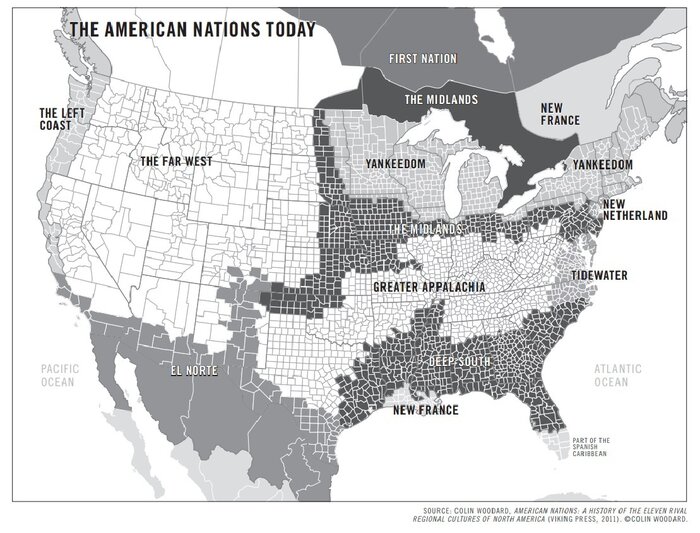Yeah, I think you could say it was both. Essentially the Puritans wanted freedom from oppression in order to practice their own form of oppression. They were basically theocratic totalitarians in New England. The way they treated Anne Hutchinson, for example, was reprehensible. And she was just one of many.The connection to the Puritans is completely news to me though. I was always under the impression that the Puritans claim that they moved to the Americas to escape oppression. However, I have also heard that they moved there so that they could more freely practice their repressive ways. I would like to think that the latter is nearer the mark and that the Nor folk gave them a good kick as they went out the door!
I haven't read "Albion's Seed" yet, but I've been reading a book that Jonathan Haidt has recommend several times: Colin Woodard's "American Nations". Fischer was an inspiration for the book, which focuses not just on the 4 British cultures that contributed to U.S., but on what he identifies as the current 11 "nations" that make up the U.S., Canada, and northern Mexico: Tidewater, Yankeedom, the Midlands, Greater Appalachia (these four correspond to Fischer's four), New France (which Fischer covered in a more recent book, "Champlain's Dream"), as well as El Norte (Spanish/Mestizo), the Deep South, New Netherland (New York), and the nations that developed later on: the Far West, the Left Coast, and First Nation (both the oldest and newest, in northern Canada).

He covers their histories, conflicts, and development from their origins to the present day, and how the culture of the original colonists has contributed down to the present day. So far, I've gotta agree with Laura: the Quakers were the best of the bunch. But each seems to me to have had at least 1 good feature, even if it was marred by other features, e.g., the Puritans' focus on citizen involvement and self-government, though in a totally authoritarian manner. The Midlanders have a healthy distrust of big government, Greater Appalachia a focus on personal sovereignty, New France its egalitarian, consensus-driven approach, El Norte's self-sufficiency and hard work, etc. But yeah, the nations with the least going for them, in my view, are Tidewater, the Deep South, and Yankeedom (and the Yankees' influence on the Left Coast). Tidewater and the Deep South, with their essentially British aristocracy and feudalism and all its attendant cruelty, and Yankeedom with their aggressive social engineering.
Looking forward to reading Fischer after this!
Last edited:

